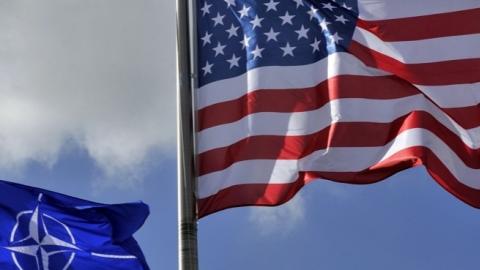Vladimir Putin is aggressive, increasingly armed, and dangerous. Besides his recent attack against Ukraine, he invaded Georgia in 2008 and has been rearming since well before then. Like his Communist and czarist predecessors, Putin seeks to expand Moscow’s control. Russian military spending—for example, on its impressive new nuclear attack submarine, the Severodvinsk, along with Moscow’s ambitious plans to rebuild its Pacific fleet—indicate that Putin does not regard the post-Communist contraction in imperial reach as permanent.
He is also highly vulnerable. He is sustained by the export of oil and gas, whose revenue lines the pockets of his political base, Russia’s plutocracy. But he needs foreign technology to extract and export energy, and he depends heavily on unchallenged control over the gas and oil markets to his main purchasers in Europe. Large oil and gas revenues and aggressiveness is a toxic brew. The invasion of Ukraine’s Crimean peninsula this past weekend demonstrates again that Putin is moving deliberately to gather back what was lost when the Soviet empire imploded.
As with stars, the death of empires is usually explosive. However, unlike stars, imperial explosion is not bound by physics to occur simultaneously with the precipitating event. The Ottoman Empire perished a slow death that ended in the early 20th century. Current Turkish prime minister Recep Tayyip Erdogan’s embrace of the old Ottomans’ religious fervor, his longing for the associated caliphate and his navalist ambitions show that a century can pass before a state convulses in partial reaction to its lost imperium.
Russia, by contrast, is only 23 years away from the dissolution of the Soviet Union. Its briefly suppressed and now reawakening imperial appetite could lead to serious trouble which would come in the shape of the West’s appeasement or a violent shock from one of NATO’s newer members which recalls Soviet occupation with horror. Either one of these has the potential to destroy NATO. The best and most remote possibility is that a unified NATO would act in the understanding that resoluteness now lessens the likelihood of a far more grave crisis in the future.
The West could do worse than to learn from its history. Justifying his invasion of Czechoslovakia in the spring of 1939, Hitler told the Reichstag that the “German minority living there [the part of Czechoslovakia he called the ‘southern land’] has been ill-treated in the most distressing manner.” Justifying his nation’s invasion of Crimea, Russian foreign minister Sergey Lavrov conjured up the equally nonsensical excuse that Ukraine’s ethnic Russian citizens are in danger. He told the U.N. Human Rights Commission in Geneva on Monday that “we are talking here about protection of the most fundamental of the human rights—the right to live and nothing more.” Autocrats are supremely unimaginative. The excuses they offer for aggression haven’t changed in 75 years. More important, the limits of territorial aggression in Russia’s case—absent persuasive Western action—will not stop with Ukraine and encompass the former satellite states that lay on the eastern side of the iron curtain. Because most of those states are NATO members the West now faces a major choice: effective action to reverse Russia’s annexation of Crimea or the real prospect that other parts of Ukraine will be seized. Russia’s possession of Ukraine ultimately risks such neighboring states as Hungary, Moldova, Poland, Romania, and Slovakia.
So it is very important that President Obama measure his words to what he is actually willing to do. Empty threats are worse than silence. If he has not already, the president would do well to forget the “reset” with Russia and concentrate on Putin’s economic vulnerability. The economic sanctions that Secretary of State Kerry has noted—dismissal from the G-8, a freeze on Russian assets in Western banks, bans on visas for Russians—all make sense. They would pressure Putin’s base, Russia’s oligarchs. The Obama administration’s preference for acting together with other nations would be especially useful here. The EU is an immense market for Russia. European cooperation on economic sanctions would be powerful encouragement for Putin to reconsider. Longer term measures that deserve consideration include significant financial assistance to help wean Europe off its dependence on Russian hydrocarbons. In the past few years, large natural gas deposits have been discovered off the Israeli and Cypriot coasts. If these hydrocarbons can be extracted and transported safely north, Europe’s dependence on Russian energy will decrease. Were the U.S. to provide security in the form of a naval presence in the Eastern Mediterranean—we have none now—neither Israel nor Cyprus would be forced to consider exchanging a portion of their natural gas for the security that Russia’s small but growing Eastern Mediterranean fleet might provide. Redoubling efforts to increase Libya’s oil output, which is currently a tenth of what it was under Qaddafi, might also inject some needed stiffness in the European spine—as would security guarantees for Algerian oil extraction facilities. European states that rely on imported Russian hydrocarbons would also benefit substantially if the U.S. were to lift regulations that inhibit sale of abundant and—compared to Russia—relatively cheap American liquefied natural gas to states with which we do not have free trade agreements. Alternative sources of energy would hit Putin’s political base where it lives, in the wallet, and drain his political support.
Putin’s invasion of Ukraine also raises the question of whether it is prudent for the Obama administration to proceed with its plan to cut the U.S. Army by 50,000 troops. The invasion is a reminder that surprises happen in surprising places, and quickly. The administration’s justification for cutting the army had been that significant uses of land forces are unlikely in the foreseeable future. Neither the U.S. nor the EU is likely to send ground troops to defend Ukraine from invasion. But the prospect that Russia could invade the Baltic states or other NATO member states in the region is far more realistic today than it was a week ago. NATO’s Article 5 commits each signatory to consider an armed attack against one state to be an armed attack against all states. It has been invoked once, by the U.S. following 911. No one wants to see it invoked a second time. An administration reversal on cutting the Army with an accompanying explanation of concern about continued Russian aggression would send a useful message to Moscow. Backing it up by repositioning U.S. forces to those NATO states that border Ukraine and are willing to accept a U.S. ground presence until Russia withdraws its troops from the Crimea would also demonstrate resolve. American and EU security assistance would strengthen Ukraine’s ability to defend its sovereignty against likely future Russian aggression.
Since the Russian invasion there’s been some handwringing in the West about the prospect of a renewed cold war with Russia. This is understandable. But a cold war is much to be preferred to a hot one. And this is where we are headed if Putin discovers that there is no penalty for aggression.
















